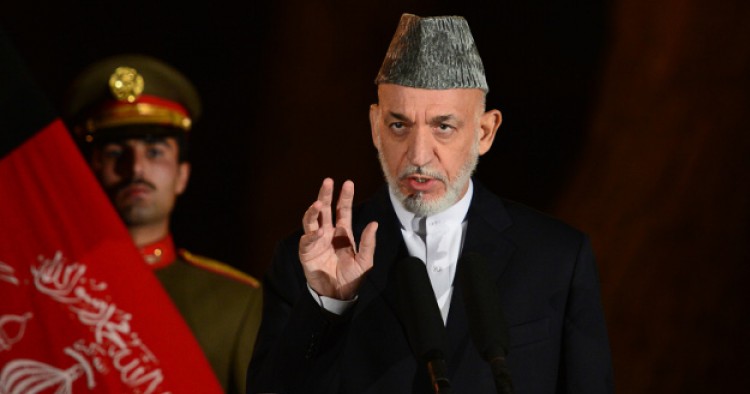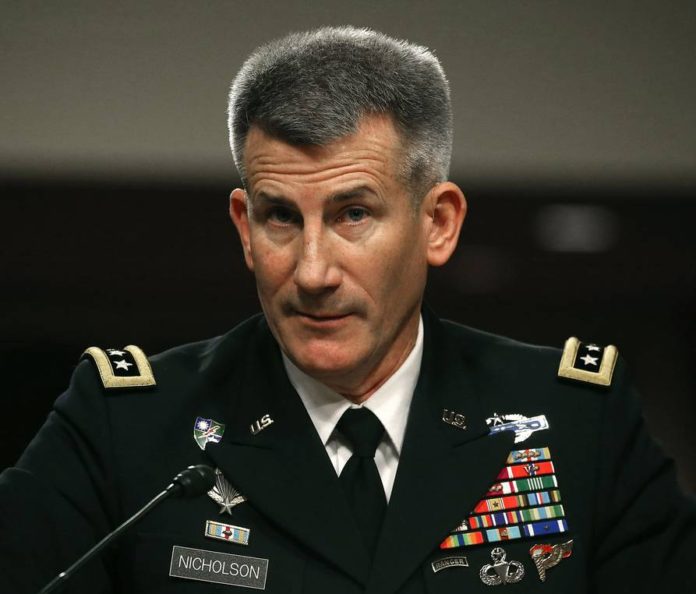After the change of administration, the Afghanistan issue is once again picking up momentum in the American calculus. The month of February saw a series of high profile terrorist attacks in various urban centers of Pakistan. Linkage between the two is quite complicated and very strong and that is why in the contemporary world there can be no mention of Afghanistan sans Pakistan.
Sensing the void in President Trump’s understanding of Afghan issue, every Tom, Dick and Harry in the American policy circle is trying to catch his attention by suggesting all sorts of propositions — hence, conspiracy theories abound. Commander Resolute Mission Support General John Nicholson has been lobbying for return of additional foreign troops to Afghanistan since the Obama days, he has redoubled his effort since the change of guards at the White House. To win support for his arguments he has added another flavour in the curry by floating the opinion that Russia, Pakistan and Iran are pursuing their own agendas with regard to fragile Afghanistan, thus complicating the fight against terrorism and extremism. “We’re concerned about outside actors,” he told VOA’s Afghan service in an interview. Earlier Pakistan’s Army chief General Qamar Javed Bajwa had taken along Nicholson, on January 09 in a rare visit to North Waziristan, a place that was once considered a no-go area because of the presence of local and foreign militant groups. Nicholson praised the country’s anti-terror campaign in the tribal areas. Last year, Senior US politician and chairman of Arms Services Committee Senator John McCain also visited North Waziristan and had heaped praise on the Pakistan Army for resorting normalcy in the region.
Nicholson is concerned about Russia’s links with the Taliban and its renewed effort to exert influence in the region by convening six-country peace talks, excluding the United States. “Russia has been legitimizing the Taliban and supporting the Taliban,” he said, adding. “I’m very sorry to see Russia supporting the Taliban and narco terrorism.” At the same time the US also doesn’t rule out a role for the Taliban. The Russian point of view is that it does not provide material support to the Taliban and only maintains contacts to encourage them to enter peace talks in a meaningful way. Nicholson is of the view that Iran may be supporting extremists in western Afghanistan.
The new administration has made a flurry of contacts with top Afghan and Pakistani officials in a run-up to revamping its Afghanistan policy. Two prongs of new policy are now a distinct possibility: pressure on Islamabad to “do more” and addition of more American/Nato troops to Afghanistan. “We want cooperation from Pakistan against all terrorists. We all hope for a change in Pakistani behavior. This is in Pakistan’s interest.” Nicholson said. He opined that there was a need for a “holistic review” of the relationship with Pakistan, “Our complex relationship with Pakistan is best assessed through a holistic review.” The general also added that he needed “a few thousand” more soldiers in a “very, very tough fight” because “the enemy is trying to seize cities, as a new dimension to the fight.” Pakistan has played down these remarks by Nicholson with a senior official saying there was nothing new or significant in his statement. He added that the remarks reflected the American military’s “frustration over security challenges they are facing in Afghanistan”.
Last year Afghan National Security Forces (ANSF) suffered nearly 7000 fatalities, up from an oft quoted number of 6600 during 2015. This is a phenomenal figure. Afghan forces have suffered twice as many casualties in the last two years as foreign occupation forces did during the preceding decade. According to American figures, the Taliban hold and control about 15 percent of Afghan territory; the actual figure is much higher, the Taliban have effective jurisdiction over large swaths of rural territory where they collect taxes, manage economy and administer judicial courts. The Afghan government controls about 57 percent of the country’s populated districts, down from about 72 percent in November 2015 according to a report released on January 30 by the US Special Inspector General for Afghanistan Reconstruction (SIGAR).
The Afghan government is struggling to protect only the urban centers and some important urban centres have often exchanged hands between Taliban and ANSF since after the end of ISAF/Nato military mission in 2014. The tactical level fight has degenerated into a protracted “stalemate.” “Our Afghan partners have been sustaining very significant losses,” Nicholson said. “And I’m not sure that’s sustainable,” Nicholson narrated in a recent testimony before Services Armed forces Committee of the US Senate.

True to his track record, former Afghan President Karzai urged Americans to persuade Islamabad to end its ‘policy of safe havens to terrorist groups’. Karzai is hopeful that there would be an opportunity for the US to reverse its policy on Afghanistan due to Trump induced US-Russia ties.
The new administration appears to be following a careful policy towards Pakistan. The Trump administration has assured Pakistan that it would not be included in the list of countries whose nationals were barred from entering the US. The US has not yet unveiled its policy whether or not it will send in more troops or go for reconciliation in Afghanistan.
Some people in the new administration have Afghan experience, including Secretary Defence James Mattis who had served as head of the Central Command that oversees military operations in Afghanistan. Incidentally General Bajwa and Mattis recently spoke on the phone and according to ISPR, “Both reaffirmed their commitment towards the common goal of peace and stability in the region and discussed measures towards that end. Both also agreed on continued engagement at multiple levels.” Mattis lauded the sacrifices and resilience of the people and armed forces of Pakistan. In his confirmation hearing before the Senate Mattis had underlined the need to remain engaged with Pakistan and went on to say that the US would offer incentives to encourage Pakistan to cooperate with Washington on some of the pressing issues, including fighting militancy.
The Afghan government has endorsed General Nicholson’s wish for additional foreign troops ahead of another intense fighting spree—Spring Offensive. “We welcome the proposal of deploying thousands of additional troops to Afghanistan to effectively train and advise Afghan forces. The war in Afghanistan is a war against terrorism and we want this war to reach a successful end. In that regard, we think this is a positive step”, an Afghan defence ministry spokesman stated. Starting from 1,40,000 troops from 49 countries during the surge years, the number started falling in 2011, tapering off to little over 13000. US special operations troops routinely accompany and advise Afghan forces on combat missions, while US fighter jets and drones provide air support and surveillance. So far ANSF has not been able to take back any territory from the Taliban without foreign troops joining the combat.
In the meanwhile Taliban have urged President Donald Trump to withdraw US forces from the “quagmire” of Afghanistan. In an open letter to Trump released on one of the Taliban’s official web site, the content stated that the US had lost credibility after spending a trillion dollars on a fruitless entanglement. “So, the responsibility to bring to an end this war also rests on your shoulders.” The Taliban warned Trump against relying on the kind of “unrealistic” reports presented to former presidents by their generals: “They would emphasize continuation of war and occupation of Afghanistan because they can have better positions and privileges in war.” The statement also accused the US of imposing a “surrogate administration” on Afghanistan.
Afghan officials are pushing to create a “safe zone” for Taliban insurgents in a bid to wean them away from traditional sanctuaries inside Pakistan, in a radical and contentious strategy to de-escalate the conflict. This strategy aims at undercutting Pakistan’s influence over the Taliban. “I urge the Taliban to return to Afghanistan. We should make a safe zone for them and their families,” Kandahar police chief Abdul Raziq told a gathering in January. “We can no longer rely on foreign governments and embassies to end the war”, he added. Another perspective has it that a former Helmand governor Sher Akhundzada has warned that, “The government shouldn’t be giving safe zones to terrorists.” Some observers have dismissed the strategy as “illogical” as the Taliban already control vast swathes of Afghan territory. Afghanistan’s National Security Council did not officially confirm the government strategy, however, it confirmed that, “The Taliban are allowed to relocate to Afghanistan under state protection.”
While we wait and see how the Afghan conflict unfolds from here, there is a need to envision all likely scenarios and postulate response options.




